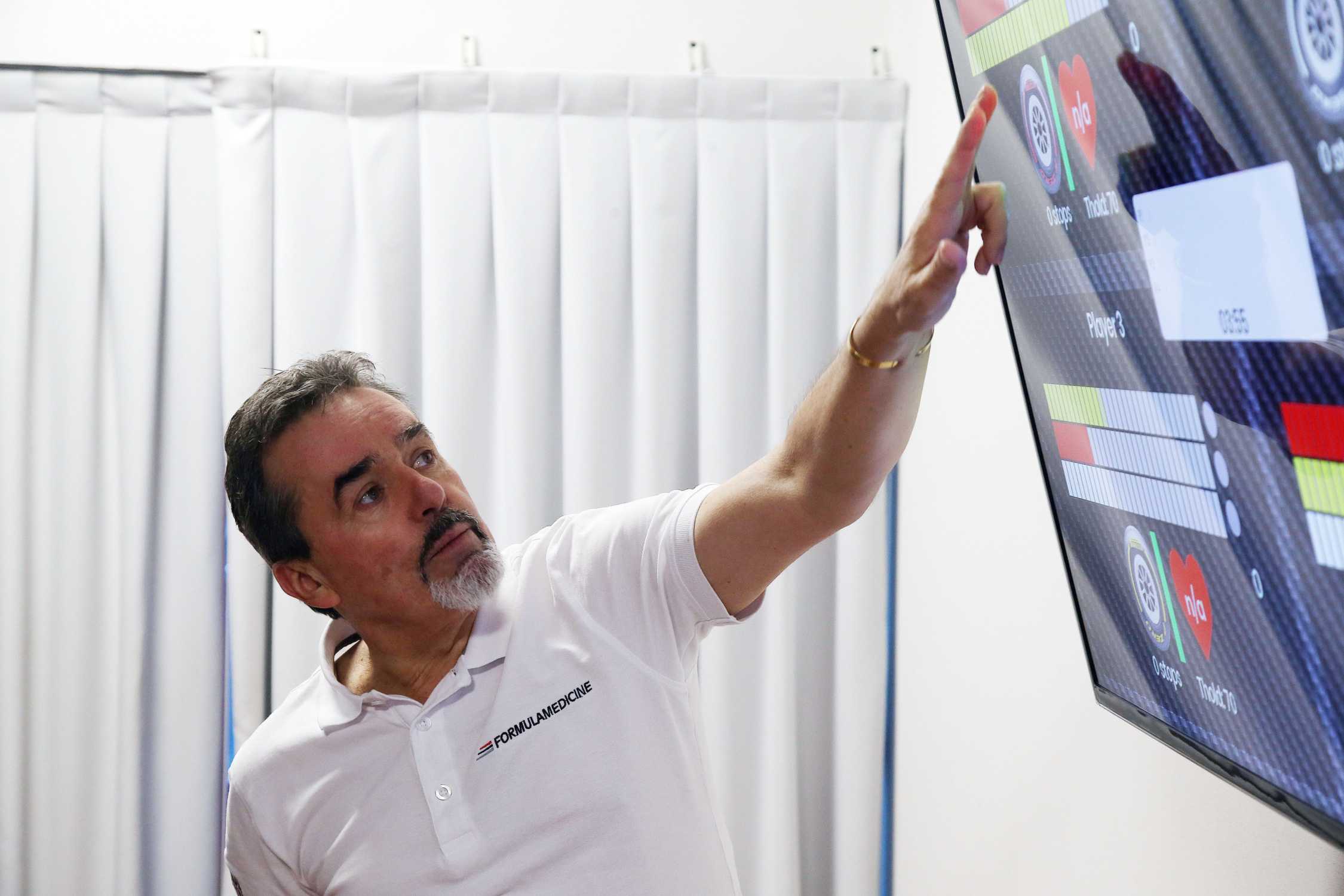
BMW factory drivers have been benefiting from progressive training philosophy for years.
Munich. Mental strength plays an increasingly important role in motorsport. Simply driving a car fast is not enough if you want to be a world-class racing driver. Being able to deliver top performance under pressure, in unpredictable situations or over a long period of time is what makes a champion. Dr. Riccardo Ceccarelli has set new standards in mental training with his Formula Medicine. BMW Motorsport has been working closely with Ceccarelli for many years. The BMW works drivers and the BMW Junior Team benefit from his progressive training philosophy.
Video: The BMW Junior Team during mental training: https://b.mw/Mental_Training.
Tuscany has been one of the most popular travel destinations for BMW factory drivers for years. However, it is not the sea, the wine or the good food that draws them to the coastal town of Viareggio (ITA), but the training grounds of Formula Medicine. Until the current COVID-19 crisis began, Dr. Riccardo Ceccarelli and his team were probably the most popular place to go for some of the best racing drivers in the world and many young athletes when they wanted to work on their physical and mental strength – and will be again afterwards, because whether it is medical examinations, fitness training or mental training: Formula Medicine offers a holistic program.
Mental training plays the main role. “It is completely different from what existed before,” says Ceccarelli, explaining: “Our philosophy is that mental training is only there to optimize the performance of the brain. Many people only go to a mental trainer when they have a problem that they want to solve. Our mental training is aimed at healthy top athletes and top racing drivers who do not have a problem but want to optimize their brain performance even further. This is a completely different approach.”
As a starting point for this new approach, Ceccarelli, who wanted to become a professional racing driver himself in his youth and started working as a doctor in Formula 1 in 1989, based his approach on the typical processes in motorsport. “In over 30 years in racing, I learned from engineers that objective data and its analysis are the most important thing,” says Ceccarelli. “We have applied this to our mental training. We have developed our own hardware and software with which we can objectively measure brain performance. When analyzing, a driver can use the data to directly identify his strengths and weaknesses, as if in a mirror.”
Three levels of mental training.
However, the sober analysis of the status quo is only the first step. This is followed by the athlete’s self-knowledge, which is also extremely important. “Many of the best racing drivers in the world are characterized by a high level of self-knowledge,” says Ceccarelli, who knows Formula 1 drivers Charles Leclerc (MON) and Daniel Ricciardo (AUS) very well and has worked intensively with them. “The best racing drivers can assess themselves very well and always strive to learn as much as possible about themselves. Only those who can assess themselves very well will also deliver optimal performance in stressful situations. That is the key.”
The third key point in Formula Medicine’s mental training philosophy is efficiency. Ceccarelli explains: “When you optimize an engine, you not only try to get as much power out of it as possible, but also make it as efficient as possible. We do the same with the brain: increase performance while keeping energy consumption as low as possible. The more efficiently the brain works, the more powerful and enduring it is under stress.”
Formula Medicine uses a variety of training forms and measurement methods to reach the various levels. Brain performance is measured in parallel with concentration, coordination and reaction exercises. Flexibility and adaptability of the brain are also trained. “If, for example, the weather changes quickly on a race weekend, the driver must be able to mentally adapt to the new conditions within a short period of time,” says Ceccarelli.
Alexander Sims has benefited from mental training.
One BMW works driver with whom Ceccarelli has worked intensively in preparation for the current season is BMW i Andretti Motorsport driver Alexander Sims (GBR). After a few years in GT racing, he joined the ABB FIA Formula E Championship at the end of 2018 and initially found it difficult to adapt to the completely new challenges of the racing series. “Alexander has made great progress in preparation for his second Formula E season,” says Ceccarelli. “He was already a top driver before he worked with us. We just showed him ways in which he could make even better use of his talent.”
The preliminary result: Sims took pole position in the first two races of the current Formula E season, celebrated a victory and is third in the drivers’ championship. “Formula Medicine is a wonderful place to be completely honest about your own performance and to work constructively together on improvements,” says Sims. “There wasn’t one measure that helped me in particular, it was more a few different levers that we adjusted so that I could deal even better with the unique pressure situations in Formula E.” Sims talks about tools that mental training gives him to be able to react better to increasing pressure than before. “That can be just sitting on a chair and clearing my head, or very small physical exercises that help me reduce the adrenaline.”
Teamwork is also an essential aspect of Formula Medicine’s work. In the run-up to the current Formula E season, Sims was in Viareggio with his fellow driver Maximilian Günther (GER) and the chief engineer of BMW i Andretti Motorsport, Valentino Conti. “It was the first time for me that an engineer was there. It was very interesting and, in my opinion, it was very useful for us,” says Sims. “I was impressed to see how strong he was in some of the mental tests, much stronger even than us drivers. It was very valuable to go through the processes together and grow together into a stronger team.”
BMW Junior Team was at Formula Medicine for two months.
This was also the title of the BMW Junior Team’s two-month training camp at the beginning of this year. Dan Harper (GBR), Max Hesse (GER) and Neil Verhagen (USA) prepared intensively physically and mentally for their first races, lived together in a house and grew together as a team. “The guys were open to our philosophy from the start and had the will to work hard on themselves,” says Ceccarelli. “These are the best prerequisites for working successfully with Formula Medicine. I am therefore happy that all three drivers completed the training camp with great enthusiasm and have also grown together on a personal level to form a real BMW Junior Team.”
Ceccarelli is particularly keen to promote young up-and-coming drivers, as mental training can help them reach their potential much earlier in their careers. “Normally, a racing driver reaches optimal mental maturity at 27 or 28 years of age,” says Ceccarelli. “Our goal is for young drivers to reach this maturity at 20 or 21 thanks to our training.”
The juniors are enthusiastic about the training camp. “Personally, the most beneficial thing for me was learning how to assess myself better,” says Hesse. “I’m already amazed at how much of what I’ve learned I can draw on when running, doing strength training or in the racing simulator. I’m sure it will be the same later, when we’re racing in real races again.” Harper confirms this and adds: “Since I didn’t know anything about mental training before, I’ve made really big progress. And even now that we’re at home and can’t train in Viareggio, we have online sessions that really help me to stay in good shape, not just physically but above all mentally.” Verhagen says: “When I came to Formula Medicine, I quickly learned that the brain is just like a muscle that needs to be trained regularly.”
It is not just the BMW i Andretti Motorsport drivers and the BMW Junior Team who regularly visit Viareggio. Formula Medicine has also become a second training home for the DTM and IMSA drivers as well as the BMW GT drivers. As soon as the current situation allows it, the next visits to Dr. Ceccarelli and his team will surely follow.

Ethel Purdy – Medical Blogger & Pharmacist
Bridging the world of wellness and science, Ethel Purdy is a professional voice in healthcare with a passion for sharing knowledge. At 36, she stands at the confluence of medical expertise and the written word, holding a pharmacy degree acquired under the rigorous education systems of Germany and Estonia.
Her pursuit of medicine was fueled by a desire to understand the intricacies of human health and to contribute to the community’s understanding of it. Transitioning seamlessly into the realm of blogging, Ethel has found a platform to demystify complex medical concepts for the everyday reader.
Ethel’s commitment to the world of medicine extends beyond her professional life into a personal commitment to health and wellness. Her hobbies reflect this dedication, often involving research on the latest medical advances, participating in wellness communities, and exploring the vast and varied dimensions of health.
Join Ethel as she distills her pharmaceutical knowledge into accessible wisdom, fostering an environment where science meets lifestyle and everyone is invited to learn. Whether you’re looking for insights into the latest health trends or trustworthy medical advice, Ethel’s blog is your gateway to the nexus of healthcare and daily living.



